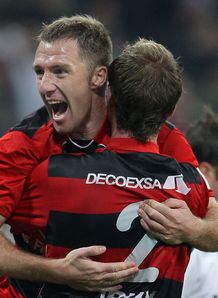 Let's face it, being a coach of a European futbol team isn't the most stable position in the world when it comes to job security. You look around at the different leagues all over the continent and the exceptions are few and far between. Sir Alex Fergueson at Manchester United and Arsene Wenger at Arsenal stand out as coaches who have been with their teams for more than 10 years. In Sir Alex's case, he's been there 20+ years and is a stalwart at Old Trafford.
Let's face it, being a coach of a European futbol team isn't the most stable position in the world when it comes to job security. You look around at the different leagues all over the continent and the exceptions are few and far between. Sir Alex Fergueson at Manchester United and Arsene Wenger at Arsenal stand out as coaches who have been with their teams for more than 10 years. In Sir Alex's case, he's been there 20+ years and is a stalwart at Old Trafford.Yet venture to the south and in Spain you will find a completely different story. Former Barcelona coach Frank Rijkaard was the the Catalan club for five years. That's an eternity in Spanish futbol. Consider that Real Madrid just fired Bernd Schuster and all he did was deliver a La Liga championship last year. Or even more curious is the fact that Fabio Capello, in two separate stints with the Madrid side, won a La Liga crown in each year only to be fired after the season... Que coño???? At least each one of those coaches made it at least one year. The same cannot be said this year in La Segunda. The year is not even half over and there have been seven, count 'em seven, coaching changes. And what's even more mindblowing is that a single club has accounted for FOUR for those. That's right, one team in El Infierno has already had FOUR coaches this year. If you're smart, you know who I'm taking about. Just go back to my previous post and see who is the penultimate 'colista'.... Alicante.
It didn't take long to start this circus either. In Jornada 7, Juan Carlos Granero was replaced by Asier Garitano. A whopping three weeks later during Jornada 10, Garitano was replaced by Nino Lema. Lema actually made it another five weeks to Jornada 15 before being replaced by Manolo Jimenez (see above photo)who hopefully by now has learned the names of his players as he tries to direct them out of the cellar of El Infierno. Alicante has just one win this season and a mere 9 points. The outlook does not look good. The team spent last year in the Segunda B and it's a good bet they'll return there even before the month of May starts. But hey, look on the bright side, at least the players will be able to soak up the spring Valencian sun with no pressure at all once they have 'secured' their relegation. Buena suerte chavales....
On to the games. Side note: Real Murcia just announced that they have fired Javier Clemente and brought on Jose Miguel Campos to try to salvage their season. Will it have an impact? Doubtful. Anyhow, to the games... A little shifting of the top 3. Salamanca is emerging as the strongest side in El Infierno. The Xerex freight train looks to be a little derailed after another tie, this time away at Castellon. A very nice battle is shaping up for the third pormotion spot between Hercules, Zaragoza, Castellon and Rayo Vallecano. Huesca is also right there with 24 points.
Resultados - Jornada 16
Córdoba - Rayo 0-1
Albacete - R.Sociedad 2-1
Castellón - Xerez 2-2
Celta - Zaragoza 2-0
Alicante - Las Palmas 1-2
Salamanca - Levante 3-0
Huesca - Murcia 1-0
Girona - Elche 1-1
Tenerife - Hércules 3-2
Eibar - Alavés 1-0
Gimnástic - Sevilla At 3-1
Albacete - R.Sociedad 2-1
Castellón - Xerez 2-2
Celta - Zaragoza 2-0
Alicante - Las Palmas 1-2
Salamanca - Levante 3-0
Huesca - Murcia 1-0
Girona - Elche 1-1
Tenerife - Hércules 3-2
Eibar - Alavés 1-0
Gimnástic - Sevilla At 3-1
Clasificacion
1. Salamanca - 31
2. Xerez - 29
3. Hércules - 26
4. Zaragoza - 26
5. Castellón - 25
6. Rayo - 25
7. Huesca - 24
8. Tenerife - 24
9. R.Sociedad - 23
10. Albacete - 23
11. Celta - 22
12. Girona - 22
13. Levante - 22
14. Gimnástic - 21
15. Las Palmas - 21
16. Alavés - 20
17. Eibar - 19
18. Elche - 18
19. Córdoba - 16
20. Murcia - 13
21. Alicante - 9
22. Sevilla At - 7
2. Xerez - 29
3. Hércules - 26
4. Zaragoza - 26
5. Castellón - 25
6. Rayo - 25
7. Huesca - 24
8. Tenerife - 24
9. R.Sociedad - 23
10. Albacete - 23
11. Celta - 22
12. Girona - 22
13. Levante - 22
14. Gimnástic - 21
15. Las Palmas - 21
16. Alavés - 20
17. Eibar - 19
18. Elche - 18
19. Córdoba - 16
20. Murcia - 13
21. Alicante - 9
22. Sevilla At - 7














